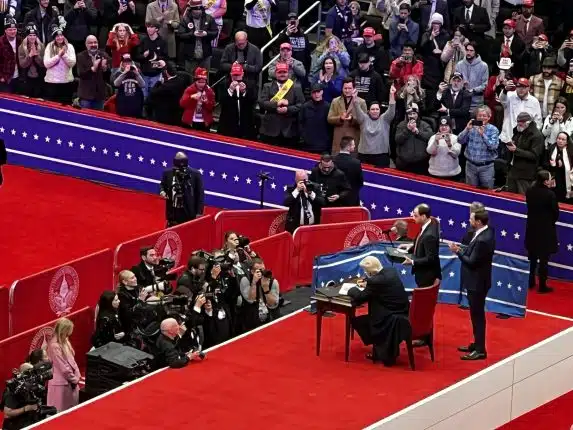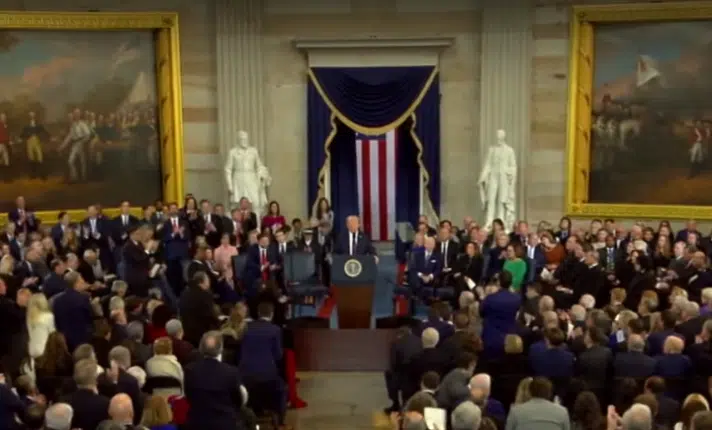
By Rick Manning
The Fourth Amendment to the United States Constitution states: “The right of the people to be secure in their persons, houses, papers, and effects, against unreasonable searches and seizures, shall not be violated, and no Warrants shall issue, but upon probable cause, supported by Oath or affirmation, and particularly describing the place to be searched, and the persons or things to be seized.”
The Fifth Amendment to the United States Constitution states: “No person shall be held to answer for a capital, or otherwise infamous crime, unless on a presentment or indictment of a Grand Jury, except in cases arising in the land or naval forces, or in the Militia, when in actual service in time of War or public danger; nor shall any person be subject for the same offence to be twice put in jeopardy of life or limb; nor shall be compelled in any criminal case to be a witness against himself, nor be deprived of life, liberty, or property, without due process of law; nor shall private property be taken for public use, without just compensation.”
The Sixth Amendment to the United States Constitution states: “In all criminal prosecutions, the accused shall enjoy the right to a speedy and public trial, by an impartial jury of the State and district wherein the crime shall have been committed, which district shall have been previously ascertained by law, and to be informed of the nature and cause of the accusation; to be confronted with the witnesses against him; to have compulsory process for obtaining witnesses in his favor, and to have the Assistance of Counsel for his defence.”
Most of our national understanding of our nation’s judicial system come from the Fourth, Fifth and Sixth Amendments to the United States Constitution as taught by the Law and Order television show and its Perry Mason-like predecessors.
This is why the Edward Snowden revelations that our federal government has been engaging in mass surveillance against U.S. citizens for years as part of the ‘war on terror’ is unbelievable to many.
After all, almost twelve years ago, the Supreme Court ruled in United States v. Antoine Jones, No. 10-1259 that a warrant is required for police to place a GPS tracking device on a vehicle of a suspected drug dealer as this was an unlawful search under the U.S. Constitution.
Reuters quoted an American Civil Liberties Union (ACLU) attorney, Steven Shapiro, explaining the broader implications of the ruling saying, “A majority of the court acknowledged that advancing technology, like cell phone tracking, gives the government unprecedented ability to collect, store, and analyze an enormous amount of information about our private lives.”
Subsequently, we have learned that the federal government is collecting and storing massive amount of data from cell phones, emails and other communications on Americans without regard for the rights of individuals to not be surveilled. This mass surveillance cannot be justified given the U.S. v. Jones decision over a simple GPS placed on an actual criminal suspect’s vehicle. If a suspected drug dealer is protected from tracking, it is impossible to reconcile the mass surveillance that Edward Snowden revealed and former National Security Agency (NSA) intelligence official Willam Binney and former FBI counter-terrorism agent Tim Clemente have talked about in the media.
What has been revealed is a tapestry of surveillance of each individual stored in government databases allowing prosecutors and others to look back into time revealing not only on-going activity, but even the content of what was said on mobile phone devices.
Binney quit the NSA when he discovered that the agency was using software he developed to surveil private citizens without the benefit of a warrant. Snowden revealed the all-encompassing nature of the surveillance, and Clemente claimed to CNN’s Carol Costello when talking about conversations the wife of the Boston Marathon bomber had with the now convicted terrorist, “I can tell you that no digital communication is secure. So these communications will be found out. The conversation will be known.”
Most people would not be overly alarmed by the ramifications of the U.S. intelligence agencies having an all-encompassing file on most Americans including the ability to look back at telephone and other digital communications if those same agencies had not become politicized to such a degree that they attempted to overturn the results of the 2016 election of President Donald Trump, under false pretenses that Trump was somehow a Russian agent, and then carried over the top secret investigation into Trump after he was sworn into office and sought to destroy his presidency with it.
Yet, they did, and now those of us who told people in the early 2000s that their concerns about the Patriot Act would never happen in the United States, are being forced to recognize that we were wrong.
Now, we have the FISA Court system up for reauthorization in Congress.
The FISA Court is a means for the FBI to obtain secret warrants against people they suspect of being foreign agents. The FISA Court is also the court that renewed a warrant against a Donald Trump campaign team member, Carter Page, due to his making a commencement speech at a Russian university in 2016. The FISA Court is also the body that renewed the warrant four times at the urging of the FBI, even after the FBI knew that the underlying documentation used to justify the initial application was materially false, and politically generated.
America does not know much more about any other surveillance authorized by the FISA Court, because its proceedings are secret.
The FISA Court is supposed to be overseen by the Chief Justice of the Supreme Court, John Roberts, with little accountability to Congress outside of whatever passes for intelligence community and agency oversight.
Now, Congress is wrestling with what to do with this secret Star Chamber court where the Justice Department can declare war on anyone under any pretense to both monitor them, their contacts and their contacts’ contacts, but also go on a witch hunt for anything to justify their investigation.
After all, that is what they did to the PRESIDENT OF THE UNITED STATES. Congress recently discovered that their staff who were investigating civil liberties abuses within the intelligence agencies, were being subjected to surveillance, too. Who oversees the overseers in Congress? The deep state does.
When the public employees entrusted with protecting the security of the nation decide to turn the full weight of their investigative power against both their constitutional boss, the President of the United States, and those responsible to make certain they are not violating the Constitution, the Congress, it is unconscionable to allow the system that allows this to remain intact.
The FISA Court itself needs significant reforms beyond any that are currently in legislation being considered by Congress.
1: Past abusers of the system must be held accountable, losing their jobs and the pensions that come with it.
2: Future abusers should be held accountable by losing their jobs, pensions and freedom through imprisonment.
3: People whose data has been illegally or illegitimately obtained using the FISA Court rubber stamp warrant search process or otherwise through warrantless surveillance should be compensated for this violation of their constitutional rights.
4: The Supreme Court Chief Justice should be required to issue a public report to Congress which delineates numerically how many warrants have been obtained and renewed for each calendar year.
5: Request for renewal of a FISA Court warrant should be subject to progressively higher standards of proof. If this had been the case in the Trump warrants, the surveillance would have ended after the initial renewal of the warrant if not before, as the FBI had determined that the main underlying evidence was “salacious and unverified.” It would be the FBI’s duty to build a case or else lose the vast surveillance powers unleashed by the FISA Court issued warrant.
6: Data stored by the NSA on American citizens should be deleted after a definitive period of time, say, six months, nine months or a year, set forth by Congress.
In terms of the entire mass surveillance of the population as a whole, it is obvious that if cops cannot put a GPS tracking device on a drug dealer’s car to make certain they know where he is at any given time, that collecting and storing personal data on 339 million Americans just in case it is needed in the future is not anywhere in the realm of constitutionally allowed.
Yet, somehow under the guise of national security, the Fourth Amendment search and seizure prohibitions remain erased even in light of the political abuses of power by the no longer trustworthy public employees who have access to this information.
In 1775, Benjamin Franklin was quoted as saying, “They who can give up essential liberty to obtain a little temporary safety, deserve neither liberty nor safety.” In doing so, he was refuting colonists who were arguing that demands upon King George to end the involuntary quartering of troops and limitations on Parliament in negating laws enacted by colonial government must be dropped to avoid war.
Franklin was right in the year prior to the signing of the Declaration of Independence, and that truth carried down through the protections in the Bill of Rights remains every bit as vital today.
It is time for Congress to reign in the surveillance state and significantly reform, if not completely eliminate, the FISA Court system as it relates to domestic surveillance of U.S. citizens. We either have a Constitution, or we don’t.
Rick Manning is the President of Americans for Limited Government.







